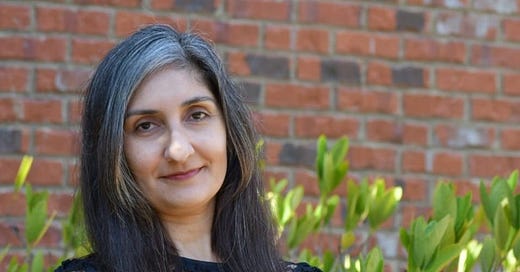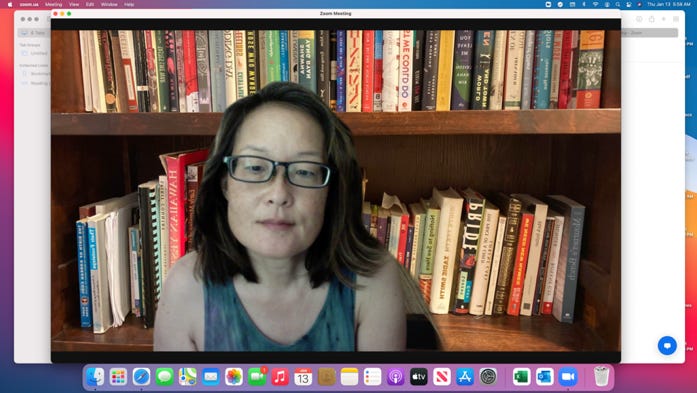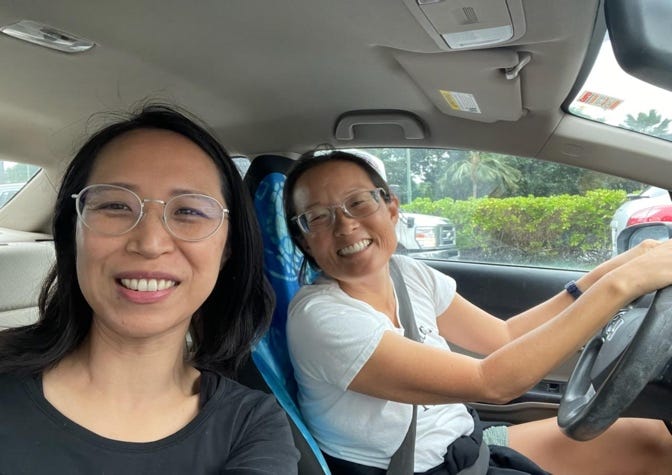Meet Woman Warrior Writer Anjali Enjeti!
Anjali Enjeti by Debashri Sengupta
February 2022’s Woman Warrior Writer is Anjali Enjeti. Anjali Enjeti is a former attorney, organizer, and journalist based near Atlanta. She is the author of Southbound: Essays on Identity, Inheritance, and Social Change, and The Parted Earth. Her writing has appeared in Oxford American, Poets & Writers, Harper’s Bazaar, the Atlanta Journal-Constitution, and elsewhere. She teaches creative writing in the MFA program at Reinhardt University and can be reached through her website, anjalienjeti.com.
How did you come to author your life?
Writing is not something I pursued with any intention the first 28 years of my life. I read several books a week. I journaled. I studied narrative. But I couldn’t picture myself as an author. I didn’t feel as if it was something available to me.
The birth of my first child changed this. I was not only flooded with words and stories about my life, I felt, for the first time, that these words carried with them some kind of value. It took a monumental moment in my life – becoming a mother for the first time – that opened the door for me to author my own life.
I highly recommend reading Enjeti’s work! I’ve really enjoyed it and put of Southbound: Essays on Identity, Inheritance, and Social Change on my syllabus for
ASIAN/ASIAN AMERICAN WOMEN’S CREATIVE WRITING WORKSHOP.
If you have questions or interest in Asian/Asian American Women’s Creative Writing email writer@drstephaniehan.com!
WOMEN’S CREATIVE WRITING WORKSHOP
This five-week mixed level cross-genre workshop focuses on voice, craft skills, and creative process. Write your story in a supportive environment.
Thursdays March 24-April 21 from 8-10AM (HST)
Guest writers: Toni Ann Johnson and Gail Vida Hamburg
BREAK: WRITE YOUR DIVORCE WORKSHOP
This four-week post-divorce writing workshop results in a completed draft of your divorce story for your personal file using the Divorce Story Structure. You don’t have to be a writer to write your divorce story. You simply have to be a woman who wants to tell her truth.
Thursdays April 7-28 2-4PM (HST) This workshop will be led by Dr. Stephanie Han and includes creativity exercises with Ahran Lee.
Input the code LOCAL for 10% off on all writing workshops (newsletter subscribers only!)
GODS AND PINEAPPLES
Above is an image of the Kim clan from Pyongyang (North Korea), prior to the immigration (bride on right) of Sang Mol Kim. She is my great-grandmother, the mother of my grandfather Kee-Chan Han (aka Hank Han). Sang Mol’s name was changed to Kyung Sang Han by her husband Yil Sung Han. In Korea, women traditionally maintain their paternal family names and do not take the surname of their spouse. Sang Mol Kim was obliged to change both her first and last name. Her name may have been changed against her desire or will, but it was clear that it was her strength that allowed the Han clan to survive.
Sang Mol arrived in Hawai’i in December 1904 at the of age 32 with her husband, two sons, and a daughter. Her eldest daughter Young Min (Hazel) went on with her husband to Riverside, California. Later Kyung Sang (formerly Sang Mol) had four more children. Her daughter Walla was hanai to another family (the Hawaiian practice of adoption to further kinship ties) as Kyung Sang nearly died from labor complications and could not care for her child. Walla briefly returned as a teenager and then went on to join her sister in Riverside, California. This family struggled. They experienced financial swindling from a business partner, and while Yil Sung was known as a jovial and spirited individual, he was a terrible pineapple homesteader.
When Hank married his mother demanded that his new bride, my grandmother, Salome, run a boarding house for the plantation workers. Kyung Sang was a tough pushy peasant woman. Hard. Coarse. Plain-spoken. In a show of protest Salome refused to comply to Kyung Sang’s demands and moved out of the house for a month. In a traditional Korean household, the mother-in-law calls the shots, but Salome who had already rebelled against her family by becoming a nurse pushed back against Kyung Sang. Kyung Sang was not anyone to cross, but then again, neither was Salome. Kyung Sang moved out. No boarding house. Salome moved back in and with that, she and Hank began their married life together.
When Kee-Chan died, leaving Salome a widow with four children, Kyung Sang demanded the insurance money. Salome refused, and so began a family rift that lasted for decades. Kyung Sang outlived her sons. Yil Sung, my great-grandfather, was a failed farmer, and if not for Kyung Sang who orchestrated the family’s survival, and his sons, the family would have fallen into poverty. What Kyung Sang didn’t count on was Salome, a widowed daughter-in-law who would fight for her own family, and disobey the Confucian order of obedience and compliance to her elders. The family structure was pulled apart. Kyung Sang was a force, but Salome was a new woman in a new land, and yes, she would make new rules.
MY NEW ZOOM BACKGROUND AND OTHER EXCITING DEVELOPMENTS…
CHECK OUT my Youtube channel where I will be uploading videos on writing, reading, literature, creative process, health, and wellness.
Master Narratives is a slightly shorter version of the sign-up lecture I gave throughout 2021.
Yes, Dear Reader, after two years of COVID zooming I realize that I am supposed to use a background with bookshelves. Such a background, I am told, gives credibility.
Months ago I had a momentary existential crisis when I suddenly understood that guinea pig images (Cookie; Cocoa) were not symbolic of women’s empowerment through narrative. At the start of COVID I asked my secondary students if they wanted to see Dr. Han or Cookie and Cocoa chat about narrative. I don’t think I got a single vote.
This idea of presentation is significant and always illusory. After all, how does one know about the individual behind the Zoom camera? There’s an idea here we can savor about our existence as utterly ephemeral, temporal, elusive even, despite apparent accessibility. How we reach across the wires has been weighing on me, and I’m now uploading what I think can be useful to people on Youtube and Substack. Let me know what you would like me to discuss, explicate, or simply comment on. I can explain complicated concepts in simple ways. It’s one of my magic powers.
You may be wondering about the bookshelf.
A) I have not read all the books.
B) I like some more than others.
C) There is no order to them. OCD pals come on over and organize. Have a go!
Click here for a video about how I read, what I read, and how we should not discipline ourselves about our reading habits.
Questions? Drop a line: writer@drstephaniehan.com
WRITERS
Before it got all Omicron mad, I was lucky to meet up with amazing writers I felt so fortunate to have in class. I’ve been teaching long enough to be able to figure out when I’m in the presence of women who are going to change how we think and feel through words. Watch for these writers—I’m so impressed with their work.
Lilly Nguyen was in Women’s Creative Writing Workshop and Intersectionality: Manuscript Workshop.
Reema Rajbanshi the prize-winning author of Sugar, Smoke, and Song was in Asian/Asian American Women’s Creative Writing Workshop.
BOOKS – NEW and GREATEST HITS
I’m again doing Asian and Asian American women book recs – both new and greatest hits.
Songs of the Kisaeng Translated and Introduced by Constantine Contogenis and Wolhee Choe. I think this is a classic—there are translated poems from the 16th and 17th c. by kisaeng, women who were courtesans, artists and entertainers in Korea. Quite a few were women poets. These poems in this collection are sijo, a three-line form. Note that translation is an imperfect art. Rhythm and structure shifts. I’ve had this book for many years and referred to it when I was teaching poetry in the schools. It’s important for students to see that there were multiple forms of poetry beyond the haiku. I also like that it was a form embraced by women.
WRITING ADVICE
If you have questions about creativity, process, writing, please drop me a line and I will answer in my column for The Hawai’i Review of Books. I’m also available for one-on-one coaching and editing.
Please forward this substack news on to your friends!
MERCHANDISE
Woman. Warrior. Writer. Masks and T-shirts.
I am getting rid of my stock of masks and T-shirts (sizes MLXL only).
· Buy a single mask ($20) and I will send you two ($40) masks.
· Buy a single T-shirt ($25) and I will send you two ($50) T-shirts.
· Buy a single mask ($20) and T-shirt ($25) bundle for $25.
Write NEWSLETTER in your order. MERCHANDISE offer for U.S. newsletter subscribers and pals. Proceeds of Woman. Warrior. Writer. products go to scholarships.
Please inquire about payment plans and financial aid writer@drstephaniehan.com











